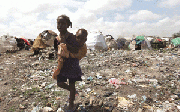For victims of the drought in Somalia, every day is merely a battle for survival. After walking days seeking refuge from the famine with her two children, a mother collapsed and died, leaving them behind to complete the journey to salvation alone. “The little girl who was eleven had to carry the baby…until she made it to the border,” said Life for Relief and Development (LIFE) Community Relations Coordinator Ayman Aburahma.

|
| Internally displaced people wait to collect food aid from a distribution centre at the Badbado settlement camp in Somalia’s capital Mogadishu August 18, 2011. Britain said on Wednesday that hundreds of thousands of children could starve to death in Somalia if the international community did not ramp up its response to the famine there, and pledged a further $48 million to aid children and livestock owners. REUTERS/Ismail Taxta |
He says one mother lost five children at once, and another was forced to decide which of her two children to feed. “If she split the food both would die, so she decided to give it to only one…The other one would die anyways.” LIFE is a U.S. American Muslim humanitarian relief agency.
The majority of Somalia, a country located in the Horn of Africa, is suffering from the drought. Several regions in the country lack rain and can’t grow crops. LIFE President Dr. Mujahid Al-Fayadh says the Horn of Africa has been the organization’s focus for three years because the shortage of rain and other resources. “It’s an accumulation of so many years of poverty and they were not able to grow crops,” Dr. Al-Fayadh said.
Somalis are turning to Kenya where refugee camps are already over capacity and plagued by diseases as a result. The Kenyan government and others including the international community are being condemned for not acting fast enough to prevent the high death toll. The crisis, which has been visible for years, has reached its height and is unavoidable now with millions of people leaving their homes. According to a report 3,000 babies have died in the Kenyan camps.
There is speculation that rain may arrive in October, but it still wouldn’t be enough to solve the problem because there are so many other challenges.
Dr. Al-Fayadh says Somali refugees will stay in Kenya for a few years and the international community must continue to provide food throughout the period. But that could be difficult with countries around the globe facing financial burdens.
Factors intervening in humanitarian efforts is the inflation in food costs, the soaring prices of shipping and security risks. LIFE has donated 5,166 food baskets to victims of the drought. Each basket costs about $150 and consists of items including flour, cooking oil, sugar, rice, dates and powdered juice — a source of vitamin C.
Dr. Al-Fayadh says the price of food baskets have never been this high. LIFE plans on continuing its efforts in Africa. It has dug 15 water wells on the impoverished continent. “Once you find water for people you have solved maybe 90 percent of the problems,” he said. The cost of each well is $3,500.
The plight of Somalis has caught the attention of LIFE donors. In just five days they contributed $400,000 to the cause.
In Dearborn the Lebanese American Heritage Club Youth Leadership Committee started a canned food drive which will end Aug. 24. So far 15 boxes have been collected and will be shipped to Somalia on Aug. 25 by the Salvation Army.
Aburahma says he’s pleased with the response to bringing relief to Somalis, but there’s still devastation in Palestine, Syria, Libya, Yemen and additional countries that can’t be overlooked.
Some victims have made shelter out of fabric or a rice bag sack. Dr. Al-Fayadh says while there are people around the globe living under devastation, the crisis is Africa is by far the worst. LIFE has also reached out to needy people in Pakistan, Haiti, Ethiopia, Lebanon, Syria and other countries.
“They (victims of the drought in the Horn of Africa) are the most needy people on the planet — no question,” he said. “What we are providing is one segment of their life. Which means we are only providing food. How about clothing? How about medicine? How about shoes? Of course if you look at them none are wearing shoes.”
To assist LIFE in its humanitarian efforts visit www.lifeusa.org or call its North America office at 248.424.7493.
Area mosques and churches are also collecting for Somalia as well as Dearborn’s Zaman International charity organization.
Visit ZamanInternational.org for more info on how to help.






Leave a Reply